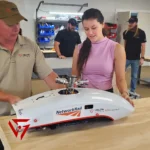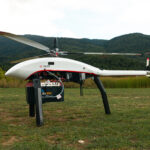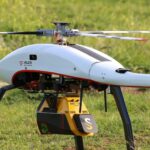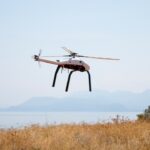Milestone enhances SAIT’s mission to support growth within the drone industry
[Xylokastro, Greece] The Southern Alberta Institute of Technology (SAIT) has successfully concluded the OEM training on the Velos V3. This significant accomplishment marks a key milestone for Canada’s inaugural remotely piloted aviation training center, which provides advanced training and certification for remotely piloted aircraft systems (RPAS) with advanced payload capacities.
Michael Seal, Chief Executive Officer of Velos Rotors, expressed his pride in collaborating with the skilled SAIT team to further the development of the VelosV3. “Their joint efforts aim to enhance the utilization of the Velos V3 UAV helicopter in industrial settings while delivering advanced training and certification for the next generation of pilots.”
Operational proficiency with RPAS requires specialized training for both pilots and mechanics, as well as product certification for operational use. SAIT’s training program is designed to provide an education comparable to that of manned aerial vehicles, where pilots receive intensive instruction tailored to a specific aircraft. In addition, this course will pave the way for the development of a commercial drone pilot license approved by aviation regulatory agencies.

Shahab Moeini, Scientific lead of SAIT’s Centre of Innovation and Research in Unmanned System (CIRUS), emphasized the meticulous selection process in choosing Velos V3 for their program. The aircraft’s exceptional flight performance and remarkable redundancy features were decisive factors in their decision. Moeini firmly believes that the VelosV3 embodies the reliability they sought and is the ideal choice for their program.
Four SAIT employees, Shahab Moeini, Sara Ashoori, Stephanie Lapointe, and Bryanna Paquette, have successfully completed the Velos Rotors OEM Advanced pilot and maintenance certification process. Ashoori, Lapointe and Paquette are the first female flight instructors for heavy-lift, long-range drones in Canada.
About Velos Rotors
Velos Rotors (www.velosuav.com) has been producing high quality UAV helicopters since 2014 for customers in the US, Europe and Asia. Velos is simple to fly while offering high reliability, flight time and payload capacity. The drone was designed with three main objectives in mind: safety, efficiency and reliability. Velos is the safest UAV in its class and the best tool for demanding and critical projects where reliability and effectiveness are key. Examples include rescue missions, human organ transportation, and the use of expensive and sensitive sensors in demanding survey missions.
About SAIT
Established in 1916, SAIT was the first of its kind, publicly funded technical school in North America. As a global leader in applied education and research — serving nearly 40,000 students annually — SAIT offers certificate, diploma, post diploma, apprenticeship and applied degree programs, baccalaureate degrees, corporate training and more than 1,000 continuing education courses, along with six dedicated, award-winning areas of research and capacity for new and emerging research. Curriculum and research priorities are developed through industry partnerships to ensure graduates have the skills and knowledge required to fulfill the demand for talent. SAIT is honoured to be recognized by Mediacorp Canada Inc. as one of Alberta’s Top Employers for 2023, and to be ranked fifth by Research Infosource Inc. in the Top 50 Research Colleges in Canada for 2022. CEOWORLD Magazine ranked the SAIT School of Business #51 on the list of Best Business Schools in the World for 2023, and the School of Hospitality and Tourism placed #15 on their list of Best Hospitality and Hotel Management Schools in the World — the only Canadian school listed — for 2023.




